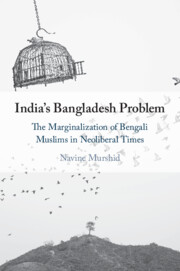Book contents
- India’s Bangladesh Problem
- India’s Bangladesh Problem
- Copyright page
- Dedication
- Contents
- Figures
- Tables
- Acknowledgments
- Introduction
- 1 Neoliberalism and Identity-Based Hierarchy
- 2 Borders as Sites of Strength and Vulnerability
- 3 Assam and the “Illegal” Other
- 4 Whatever Happened to Bengali Nationalism? The “Appeased” Muslims of West Bengal
- Conclusion
- Select Bibliography
- Appendices
- Notes
- Index
1 - Neoliberalism and Identity-Based Hierarchy
Published online by Cambridge University Press: 30 March 2023
- India’s Bangladesh Problem
- India’s Bangladesh Problem
- Copyright page
- Dedication
- Contents
- Figures
- Tables
- Acknowledgments
- Introduction
- 1 Neoliberalism and Identity-Based Hierarchy
- 2 Borders as Sites of Strength and Vulnerability
- 3 Assam and the “Illegal” Other
- 4 Whatever Happened to Bengali Nationalism? The “Appeased” Muslims of West Bengal
- Conclusion
- Select Bibliography
- Appendices
- Notes
- Index
Summary
Chapter 1 provides the theoretical premise to explain the formation of identity-based hierarchies to justify social exclusion. Bilateral relations between India and Bangladesh and differential neoliberalism in the two countries reproduce a social hierarchy that serves to socially exclude Bengali Muslims. This exclusion, the chapter contends, can be explained by analyzing how neoliberal ideas shape identity markers – religion, language and culture, geographical importance, and their intersection – which in turn affect biopolitics. In tandem with the fact that Bengali Muslims share cross-border ethnic ties with the majority of Bangladeshis, the minority-migrant complex turns the Bengali Muslim into a group that can be strategically excluded, included, scapegoated, or rendered invisible. In turn, it reveals the contradictions in society: scapegoating is an inward-looking, nationalist, and state-centric strategy because it is geared towards maintaining government control and popularity (albeit based on a constructed foreign threat); neoliberal policies are outward-looking and "decentralized" because of the rhetoric of open markets and individual freedom. Their easy co-existence effectively privatize violence, as emboldened non-state actors turn into purveyors of oppression in response to neoliberal shifts.
- Type
- Chapter
- Information
- India's Bangladesh ProblemThe Marginalization of Bengali Muslims in Neoliberal Times, pp. 25 - 67Publisher: Cambridge University PressPrint publication year: 2023

